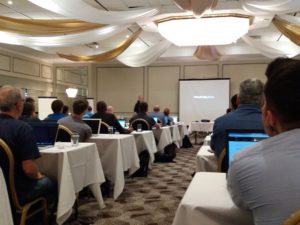Back at the start of July, I attended an Alexa workshop in Brighton. I planned to blog about it soon after, but client work took over my life a little, sending me to LA and Dublin in the process. The session was a good one and I wanted to note some of the interesting things I learned for future reference. It happened in the ballroom of a seafront hotel (note chandeliers, and those dangling lengths of cloth that probably have an actual name) and was run by David Low, an Alexa evangelist from Amazon, who’d previously worked on the Skyscanner Alexa skill.
I’m cautious about in-person training sessions, in case the pace is slower than a day’s reading and tinkering at home – particularly when some of the Amazon tutorials are so good. Here, I learned a lot of interesting information, of which this is some of the highlights:
- The example skills we looked at were written in Javascript, rather than Java, as I’m used to. It’s notable how much more concise the Javascript code was.
- Previously, I knew little of the Echo device’s technical details and it was interesting to find out about how Alexa works. Apparently the seven directional microphones are set up so one listens to the speech, and the other six record the background noise and filter it out. This explains how good Alexa is at hearing me over music.
- Amazon have given a lot of thought to how they would like people to think about Alexa. A session like this is good for communicating this vision. For example, “Alexa lives inside the Echo” or “Not building apps, building conversations”.
- Apparently about 70% of skills fail certification because their example phrases do not occur in the sample utterances. This rule seems self-evident, but somehow people miss it. Even knowing this, my first attempt at creating a skill failed the certification stage. I’ll have more to say about that soon.
- This is possibly a spoiler for the workshop, but we were told that Alexa had received 250,000 marriage proposals. It’s interesting to see that number, and that Amazon feel this is a positive thing. I feel uncomfortable about the gendering of Voice UIs and chatbots, something I want to spend more time thinking about
- Some services have 270,000 sample utterances, which is far larger than I had expected.
- I sometimes feel lost in the Alexa skill store, so it was good to have a discussion of some successful use cases:
- There is some interesting research around the benefits of Alexa for older people.
- Alexa is working to help guests in hotels.
- It was also interesting to hear how the Skyscanner app worked, allowing the user to pose questions such as “Where can I go for £100 this weekend?”
- One of the interesting things about devices like Alexa is that functionality can be unlocked over time. Apparently there are several colours available in Alexa’s glowing ring, which may be used for different things. There are also possibilities such as additional voices. Push notifications/events are a more complicated issue, with Amazon trying to work through the privacy and interruption issues.
